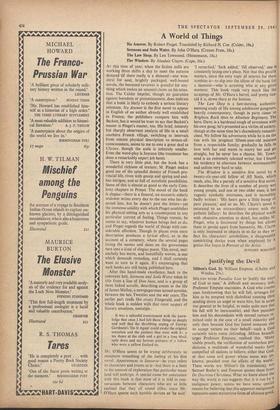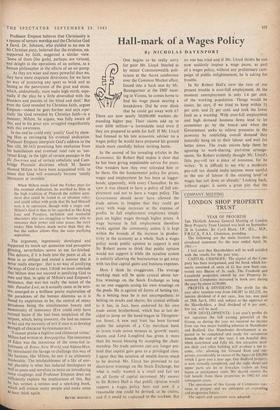Justifying the Devil
MILTON wrote Paradise Lost to 'justify the waYs of God to men.' A difficult and necessary task Professor Empson maintains. A God who creates man foreknowing that he will fall, arranges 10 him to be tempted with diabolical cunning (first sending down an angel to warn him, but in tern too general to be helpful, to make quite sure that his fall will be inexcusable), and then punishe him and his descendants with eternal torture re mitted only in the case of a small minority and only then because God has found someone else to accept torture on their behalf—such a Got certainly takes some defending. Milton himself, urges Professor Empson, realised this. 'Man) visible proofs, the verification of numberless pre- dictions, a multitude of wonderful works have compelled all nations to believe, either that God or that some evil power whose name was orl known, presided over the affairs of the world. These words are Milton's (in translation), no Samuel Butler's, and Empson quotes them fro"' De Doctrimi Christiana. What we know about thr way the world is run suggests that it is run by malignant power, unless we have some specia reason for believing that this apparent malignane4 represents some mysterious form of ultimate good
Professor Empson believes that Christianity is a system of torture worship and the Christian God a Devil. Dr. Johnson, who yielded to no one in his Christian piety, believed that the evidence, un- supported by faith, suggested a similar view.
'Some of them [the gods], perhaps, are virtuosi, and delight in the operations of an asthma, as a human philosopher in the effects of an air-pump.
• • . As they are wiser and more powerful than we, they have more exquisite diversions; for we have no way of procuring any sport so brisk and so lasting as the paroxysms of the gout and stone, Which, undoubtedly, must make high mirth, espe- cially if the play be a little diversified with the blunders and puzzles of the blind and deaf.' But even the God revealed by Christian faith, argues Empson—indeed he goes further and says espe- cially the God revealed by Christian faith—is a monster; Milton, he argues, was fully aware of this, and in his great epic struggled magnificently With this awareness.
In the end he could only 'justify' God by show- ing Him as envisaging his eventual abdication. Professor Empson interprets God's address to the Son (111, 80-343) promising him exaltation from his humiliation and eventual total rule as 'uni- versal King,' in the light of certain passages in the be Docirhia and of certain cabalistic and Cam- bridge Platonist doctrines which M. Saurat Showed Milton to have been acquainted with, to mean that God will eventually become 'totally immanent or invisible.'
When Milton made God the Father plan for His eventual abdication, he ascribed to Him in the high tradition of Plutarch the noblest senti- ment that could be found in an absolute ruler; and could reflect with pride that He had Himself seen it in operation, though with a tragic end. Milton's God is thus to be regarded as like King Lear and Prospero, turbulent and masterful characters who are struggling to become able to renounce their power and enter peace; the story makes Him behave much worse than they do, but the author allows Him the same purifying aspiration.
The argument, ingeniously developed and supported by much apt quotation and perceptive glossing, nevertheless seems to me far-fetched. This defence, if it is built into the poem at all, is done in so oblique and muted a manner that it never really emerges: that is no way of justifying the ways of God to men. I think we must conclude that Milton does not succeed in justifying God to Men and that, in spite of Milton's and Empson's insistence, that was not really the intent of the epic. Paradise Lost, as it actually came to be writ- ten, emerged as a brilliant poetic exploration of the paradoxes of the human dilemma as it is found by experience to be, the central of many Paradoxes being the simultaneous beauty and Monstrosity of innocence (Eve could .only have resisted Satan if she had been suspicious of the serpent, which, being innocent, she had no reason to be) and the necessity of evil if man is to develop strength of character by resistance to it.
1 cannot praise a fugitive and cloistered virtue,' Milton had written in Areopagitica. The innocence nf Eden was the innocence of the soma-fed in- habitants of Brave New World, and Aldous Hux- leY introduced the Savage to challenge this way of life because, like Milton, he saw it as ultimately intolerable. The intolerableness of a life of eter- nal placidity is what has induced theologians as Well as poets and novelists to insist on introducing 8(3nle roughage, and Professor Empson does not sufficiently explore the implications of this. But lle has written a serious and a sparkling book, Which will irritate many people and make some at least think again.
DAVID DAICH ES







































 Previous page
Previous page